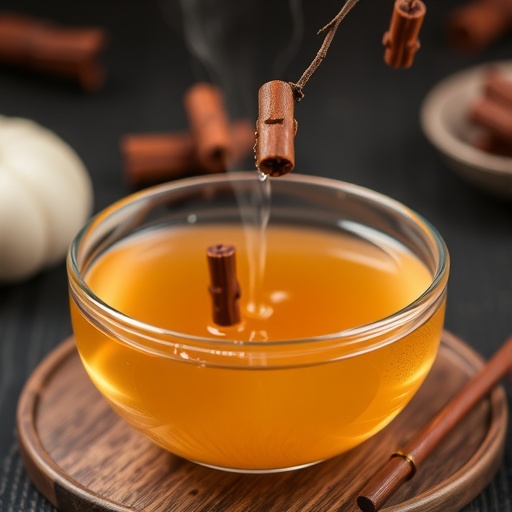In a groundbreaking study published recently in BMC Complementary Medicine and Therapies, a team led by researchers including Lu D., Yuan L., and Chen G. explored the potential capabilities of Huangqi Fuling Decoction in the treatment of gastric cancer. This ancient herbal formulation has been employed in traditional Chinese medicine for centuries, yet its scientific exploration, particularly in the context of modern pharmacology, is relatively nascent. The research utilized ultra-performance liquid chromatography-mass spectrometry (UPLC-MS) alongside network pharmacology, underlining a sophisticated approach that bridges traditional herbal medicine with contemporary scientific methodologies.
The impetus behind studying Huangqi Fuling Decoction stems from the increasing prevalence of gastric cancer worldwide, a condition known for its high mortality rate and often late diagnosis. Existing treatment options, including chemotherapy and surgery, while effective in some contexts, continue to offer limited success, necessitating the exploration of adjunct therapies that may enhance patient outcomes. The incorporation of herbal remedies presents a promising solution that warrants rigorous scientific investigation.
The team employed UPLC-MS to thoroughly analyze the chemical composition of Huangqi Fuling Decoction, identifying a plethora of bioactive compounds believed to contribute to its therapeutic effects. Such high-resolution analytical techniques allowed the researchers to quantify the various constituents in the decoction, thereby elucidating potential pharmacological mechanisms underlying its efficacy against gastric cancer. Each identified compound represents a potential avenue for therapeutic application, emphasizing the importance of understanding these molecular profiles in cancer treatment.
Moreover, network pharmacology emerged as a pivotal analytical framework in this study. It provided a comprehensive systems biology approach that integrates various biological data to predict the interactions between identified compounds and cancer pathways. This multi-target strategy is particularly useful in the context of complex diseases like cancer, as it accounts for the multifactorial nature of disease progression and the synergistic effects of herbal mixtures. Through this lens, the researchers could map out potential interactions between the decoction’s components and key molecular targets associated with gastric cancer.
In vitro experiments were also a crucial part of this research, assessing the anti-cancer properties of Huangqi Fuling Decoction in controlled laboratory settings. By exposing gastric cancer cell lines to varying concentrations of the decoction, the researchers could observe changes in cell viability, proliferation, and apoptosis rates. These experiments not only highlighted the decoction’s potential ability to impede cancer cell growth but also paved the way for further validation of its efficacy in vivo.
The researchers were keen to document not only the decoction’s effects on cancer cells but also its impact on crucial pathways involved in tumorigenesis. This included pathways associated with cellular signaling, apoptosis, and inflammation. The findings indicated that Huangqi Fuling Decoction could modulate these pathways in a favorable manner, further supporting its rationale as a complementary therapy in gastric cancer management.
Additionally, the study addressed the safety profile of Huangqi Fuling Decoction, an essential aspect of any therapeutic intervention. The team investigated potential cytotoxic effects on healthy cells alongside the cancerous ones, ensuring that the herbal remedy exhibits selective toxicity. Such insights are critical for confirming that the benefits of the decoction outweigh any adverse effects, thereby establishing its viability for clinical use.
Throughout the investigation, the research team remained acutely aware of the need for standardized preparation and dosage of Huangqi Fuling Decoction. Variability in herbal formulations can significantly affect outcomes, and thus the study’s findings stress the importance of stringent quality control measures in clinical applications. This serves not only to enhance efficacy but also to assure safety for patients opting for complementary therapies alongside conventional cancer treatments.
The implications of these findings extend beyond the laboratory, resonating with the global movement towards integrative medicine. As patients increasingly seek alternatives or adjuncts to standard treatment protocols, this research underscores the necessity for continued exploration into the efficacy of traditional herbal remedies. The fusion of ancient practices with cutting-edge science opens new avenues for therapeutic innovations that honor historical wisdom while adhering to modern scientific validation.
In conclusion, the research on Huangqi Fuling Decoction presents a compelling case for the integration of traditional Chinese medicine into the therapeutic landscape of gastric cancer treatment. The comprehensive approach taken by the researchers, combining pharmacological analyses, bioinformatics, and laboratory experimentation, offers a roadmap for future studies aimed at elucidating the mechanisms and therapeutic potentials of herbal medicines against complex diseases.
As the scientific community continues to navigate the complexities of cancer therapy, studies like this one are essential in fostering collaboration across disciplines, promoting a holistic understanding of health and disease that embraces both ancient practices and modern science.
This robust investigation into Huangqi Fuling Decoction is a testament to the promise of herbal medicine, encouraging researchers, clinicians, and patients alike to consider the full spectrum of treatment options available in the quest for more effective cancer therapies.
The research represents not only a stepping stone towards the recognition of traditional herbal medicines in the field of oncology but also a broader cultural shift towards embracing integrative health practices that recognize the intricate connections between body, mind, and spirit in the journey of healing.
Subject of Research: Gastric Cancer and Herbal Medicine
Article Title: Exploring the effect of Huangqi Fuling Decoction on gastric cancer based on UPLC-MS, network pharmacology and experiments in vitro.
Article References:
Lu, D., Yuan, L., Chen, G. et al. Exploring the effect of Huangqi Fuling Decoction on gastric cancer based on UPLC-MS, network pharmacology and experiments in vitro.
BMC Complement Med Ther 25, 405 (2025). https://doi.org/10.1186/s12906-025-05111-6
Image Credits: AI Generated
DOI: https://doi.org/10.1186/s12906-025-05111-6
Keywords: Huangqi Fuling Decoction, gastric cancer, traditional medicine, UPLC-MS, network pharmacology, in vitro studies, cancer therapy, herbal medicine, pharmacological mechanisms.




